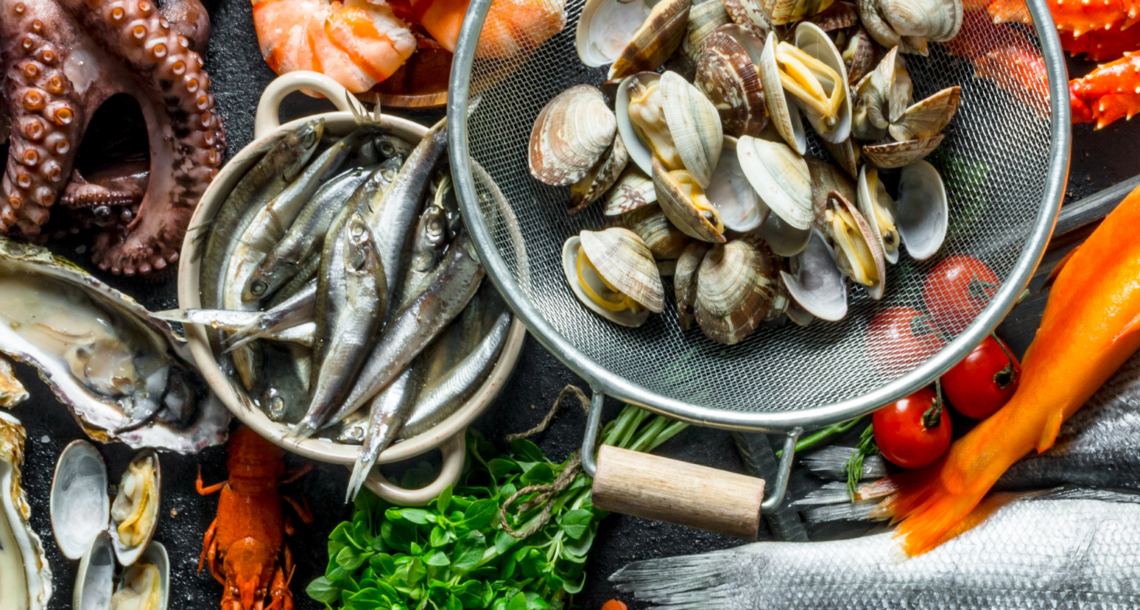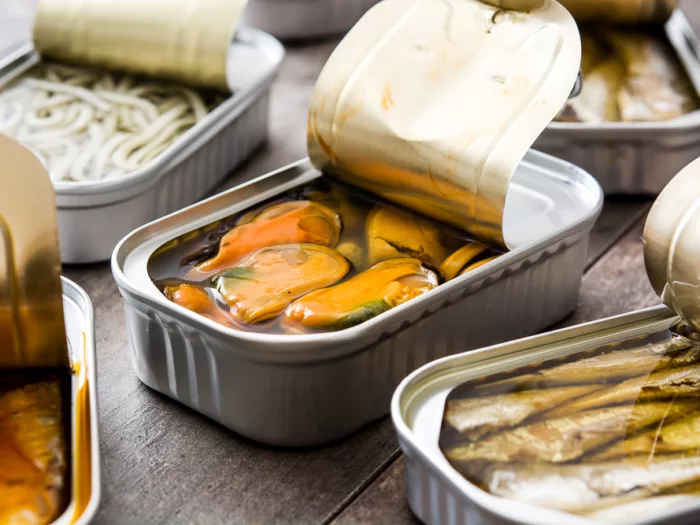
There’s nothing quite like natural nutrient-dense food from the ocean. Most people consider seafood to be a healthy addition to any diet. From fish and octopus to shrimp, clams, crab, and oysters, the ocean has a lot to offer.
If you’re following the ketogenic diet and striving to meet your health, weight loss, or fitness goals, you might be curious about whether seafood is keto-friendly. Is seafood a suitable addition to your ketogenic diet? Let’s dive into the nutrient profile and carbs in seafood.
The Basics of Seafood Nutrition
Seafood refers to ocean life that is consumed by humans, including:
- Fish
- Mollusks (oysters, clams, etc.)
- Crustaceans (lobster, shrimp, etc.)
- Echinoderms (sea urchins) [1]
Years of impressive research and human history show us that diets high in seafood are protective against a range of health conditions. All seafood is high in protein and healthy omega-3 fats. Omega-3 fats are called essential fatty acids because they are essential to life and you must obtain them from your diet. Seafood is a great way to do this. Omega-3s are also renowned for improving eye health and depression and reducing the risk of heart issues such as stroke. [2] [3] [4]
Seafoods like salmon and shrimp are especially rich in vitamins and minerals like zinc, B12, and selenium. Half of a fillet (154 grams) of wild Atlantic salmon provides 196% of your daily value (DV) for vitamin B12 and 131% of your DV for selenium. Many people today have lower levels of these important nutrients and fatty acids. [5]
Is Seafood Keto?
The good news is that all seafood in its natural form is keto-approved. Seafood contains little to no carbs and lots of healthy fats and protein, so it fits easily into a keto diet. When it comes to carb count, some types of shellfish, such as mussels, are on the higher end, while on the lower end are fish like cod. Three ounces of cooked mussels has 6 grams of net carbs, which may be higher than some other seafood but still fits nicely into a ketogenic diet. [6] On the other hand, one fillet (180 grams) of cooked Atlantic cod has zero grams of carbohydrates. [7]

While a lot of seafood is on the lean side, some oily fish species are very high in healthy fats. Mackerel is a particularly fatty fish. One fillet of cooked Atlantic mackerel provides over 15 total grams of fat and 0 grams of net carbs, making it a perfect fit for your keto macros. [8]
Of course, if you head to a restaurant, you’ll need to watch out for fried seafood or added sugars in your seafood dish. Anything breaded and fried with grain-based flour isn’t a keto-approved choice. You’ll also want to avoid added sauces that might include sugars, which increases the carb count and the chances of a blood sugar spike that will likely impede ketosis. Grilled options are more keto-friendly than breaded and fried options.
When it comes to canned seafood like sardines and tuna, most are keto-approved. Be sure to check the label for any not-so-keto ingredients, such as added dextrose (a type of sugar) or corn syrup. Check out our detailed articles on the carbs in canned tuna and canned salmon.
Seafood-Rich Recipes from Ketogenic.com
There’s so much delicious seafood to choose from on a ketogenic diet. When you’re looking for oceanic recipes, the skilled recipe creators here at Ketogenic.com have got you covered. Enjoy one of our many seafood-rich keto recipes:
- Monkfish with tomato garlic sauce
- Salsa steamed fish
- Baked cod and veggies in a red pepper sauce
- Coconut-crusted haddock
- Pan-seared sea bass
- Sesame-crusted seared ahi tuna
- Dijon-mayo salmon sheet pan dinner
- Keto poke bowl
- Baked lemon sole
- Mahi mahi piccata recipe
- Four-ingredient keto salmon dip
- Quick and easy keto sushi
- Barbecue bacon-wrapped keto shrimp
- Keto crab cakes
- Keto crab wraps
- Keto crab rangoon stuffed mushrooms
- Creamy chicken and oyster mushrooms
References
Oehlenschlager, J. (2012). Seafood: Nutritional benefits and risk aspects. Int J Vitam Nutr Res, DOI: 10.1024/0300-9831/a000108
Calder, P. C. (2016). Docosahexaenoic acid. Ann Nutr Metab, DOI: 10.1159/000448262
Trivedi, M. H. (2020). Major depressive disorder in primary care: Strategies for identification. J Clin Psychiatry, DOI: 10.4088/JCP.UT17042BR1C
Leaf, A. (2008). Historical overview of n-3 fatty acids and coronary heart disease. Am J Clin Nutr, DOI: 10.1093/ajcn/87.6.1978S
United States Department of Agriculture (USDA) Food Database. Fish, Salmon, Atlantic, Wild, Cooked, Dry Heat. FoodData Central (usda.gov)
United States Department of Agriculture (USDA) Food Database. Mollusks, Mussel, Blue, Cooked, Moist Heat. FoodData Central (usda.gov)
United States Department of Agriculture (USDA) Food Database. Fish, Cod, Atlantic, Cooked, Dry Heat. FoodData Central (usda.gov)
United States Department of Agriculture (USDA) Food Database. Fish, Mackerel, Atlantic, Cooked, Dry Heat. FoodData Central (usda.gov)








